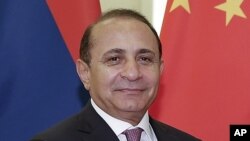Armenian Prime Minister Hovik Abrahamyan resigned Thursday, saying the country needed fresh policies, after his government struggled with an economic slowdown and protests in the capital earlier this year.
His announcement paved the way for the cabinet to resign and the president to appoint a new prime minister following consultations with parliament.
"We need a new approach, new start. That's why I've decided to resign and let the president form a new government," Abrahamyan said.
Artak Zakaryan, a deputy from the ruling Republican Party, told reporters Armenian President Serzh Sarksyan had accepted Abrahamyan's resignation.
The party said technocrat Karen Karapetyan, 53, the former head of national gas distributing company ArmRosGazprom and later Yerevan's mayor, has been nominated as his replacement.
After leaving the post of mayor, Karapetyan moved to Moscow to be appointed first vice president of Gazprombank. He is currently deputy CEO of Russian gas producer Gazprom's GAZP.MM Mezhregiongaz unit.
Experts said the new government was likely to be temporary and that the final configuration would emerge only after 2017 parliamentary elections and the end of Sarksyan's second term in 2018, when the full transition from the semi-presidential form of government to a parliamentary republic will be completed.
Two-year run
A former parliamentary speaker and an economist by training, Abrahamyan was appointed prime minister two years ago. In 2015, Armenia's economy started to deteriorate; economic growth slowed to 3 percent in 2015 from 3.5 percent in 2014 and below the government's growth forecast of 4.1 percent. The government expects 2.2 percent economic growth in 2016.
Armenia, a country of 3.2 million people, depends heavily on aid and investment from former Soviet overlord Russia, whose economic downturn has hit Armenian exports and much-needed remittances from Armenians working there.
The government has also faced political challenges, including a flare-up of violence in Azerbaijan's breakaway Nagorno-Karabakh region in April between Armenian-backed separatists and Azeri forces.
Two months later, 30 armed men seized the police station and took hostages in Yerevan, Armenia's capital. Two police officers were killed during a two-week standoff, before gunmen surrendered to the authorities.
The incident led to mass protests in the capital, when people took to the streets to secure the release of a jailed opposition politician and demand the resignation of the government and the president.
Shortly after that, Sarksyan said radical reforms in political and social life were needed. He said it was necessary to form "a government of national accord" to provide a broader distribution and division of political responsibility.
